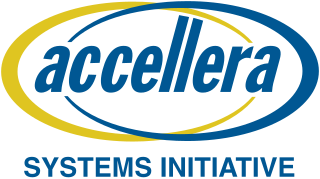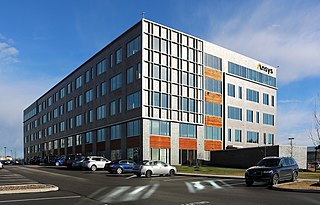Related Research Articles

An integrated circuit (IC), also known as a microchip, computer chip, or simply chip, is a small electronic device made up of multiple interconnected electronic components such as transistors, resistors, and capacitors. These components are etched onto a small piece of semiconductor material, usually silicon. Integrated circuits are used in a wide range of electronic devices, including computers, smartphones, and televisions, to perform various functions such as processing and storing information. They have greatly impacted the field of electronics by enabling device miniaturization and enhanced functionality.

Synopsys, Inc. is an American electronic design automation (EDA) company headquartered in Sunnyvale, California, that focuses on silicon design and verification, silicon intellectual property and software security and quality. Synopsys supplies tools and services to the semiconductor design and manufacturing industry. Products include tools for logic synthesis and physical design of integrated circuits, simulators for development, and debugging environments that assist in the design of the logic for chips and computer systems. As of 2023, the company is a component of both the Nasdaq-100 and S&P 500 indices.

Altera Corporation is a manufacturer of programmable logic devices (PLDs) headquartered in San Jose, California. It was founded in 1983 and acquired by Intel in 2015 before becoming independent once again in 2024 as a company focused on development of Field-Programmable Gate Array (FPGA) technology and system on a chip FPGAs.

Accellera Systems Initiative (Accellera) is a standards organization that supports a mix of user and vendor standards and open interfaces development in the area of electronic design automation (EDA) and integrated circuit (IC) design and manufacturing. It is less constrained than the Institute of Electrical and Electronics Engineers (IEEE) and is therefore the starting place for many standards. Once mature and adopted by the broader community, the standards are usually transferred to the IEEE.
Silvaco Group, Inc., develops and markets electronic design automation (EDA) and technology CAD (TCAD) software and semiconductor design IP (SIP). The company is headquartered in Santa Clara, California, and has offices in North America, Europe, and throughout Asia. Founded in 1984, Silvaco is a privately held EDA company. The company has been known by at least two other names: Silvaco International, and Silvaco Data Systems.

Ansys, Inc. is an American multinational company with its headquarters based in Canonsburg, Pennsylvania. It develops and markets CAE/multiphysics engineering simulation software for product design, testing and operation and offers its products and services to customers worldwide.
Qualcomm Atheros is a developer of semiconductor chips for network communications, particularly wireless chipsets. The company was founded under the name T-Span Systems in 1998 by experts in signal processing and VLSI design from Stanford University, the University of California, Berkeley, and private industry. The company was renamed Atheros Communications in 2000 and it completed an initial public offering in February 2004, trading on the NASDAQ under the symbol ATHR.
EtherCAT is an Ethernet-based fieldbus system developed by Beckhoff Automation. The protocol is standardized in IEC 61158 and is suitable for both hard and soft real-time computing requirements in automation technology.

Ceva Inc. is a publicly traded semiconductor intellectual property (IP) company, headquartered in Rockville, Maryland and specializes in digital signal processor (DSP) technology. The company's main development facility is located in Herzliya, Israel and Sophia Antipolis, France.

Cadence Design Systems, Inc., is an American multinational technology and computational software company. Headquartered in San Jose, California, Cadence was formed in 1988 through the merger of SDA Systems and ECAD. Initially specialized in electronic design automation (EDA) software for the semiconductor industry, currently the company makes software and hardware for designing products such as integrated circuits, systems on chips (SoCs), printed circuit boards, and pharmaceutical drugs, also licensing intellectual property for the electronics, aerospace, defense and automotive industries, among others.

Daintree Networks, Inc. was a building automation company that provided wireless control systems for commercial and industrial buildings. Founded in 2003, Daintree was headquartered in Los Altos, California, with an R&D lab in Melbourne, Australia.

Arm Holdings plc is a British semiconductor and software design company based in Cambridge, England, whose primary business is the design of central processing unit (CPU) cores that implement the ARM architecture family of instruction sets. It also designs other chips, provides software development tools under the DS-5, RealView and Keil brands, and provides systems and platforms, system-on-a-chip (SoC) infrastructure and software. As a "holding" company, it also holds shares of other companies. Since 2016, it has been majority owned by Japanese conglomerate SoftBank Group.
Ember was an American company based in Boston, Massachusetts, USA, which is now owned by Silicon Labs. Ember had a radio development centre in Cambridge, England, and distributors worldwide. It developed Zigbee wireless networking technology that enabled companies involved in energy technologies to help make buildings and homes smarter, consume less energy, and operate more efficiently. The low-power wireless technology can be embedded into a wide variety of devices to be part of a self-organizing mesh network. All Ember products conform to IEEE 802.15.4-2003 standards.
IC Manage is a company that provides design data and IP management, Big Data Analytics, Hybrid Cloud Bursting, and High-Performance Computing software to semiconductors, systems, Internet of Things and artificial intelligence IC companies.
Mindspeed Technologies, Inc. designs, manufactures, develops, and sells fabless semiconductors for communications applications in wireless and wired networks.
Siemens Digital Industries Software is an American computer software company specializing in 3D & 2D Product Lifecycle Management (PLM) software. The company is a business unit of Siemens, operates under the legal name of Siemens Industry Software Inc, and is headquartered in Plano, Texas.

GreenPeak Technologies was an Utrecht, Netherlands-based fabless company developing semiconductor products and software for the IEEE 802.15.4 and Zigbee wireless market segment. Zigbee technology is used for Smart Home data communications and to facilitate the Internet of Things, the term used to refer to devices designed to be operated and managed by internet-enabled controllers and management systems.
Arteris, Inc. is a multinational technology firm headquartered in Campbell, California. It develops the Network-on-Chip (NoC) on-chip interconnect IP and System-on-Chip (SoC) integration automation software used to create semiconductor designs for a variety of devices, particularly in automotive electronics, artificial intelligence/machine learning and consumer markets. The company specializes in the development and distribution of Network-on-Chip (NoC) interconnect Intellectual Property (IP) and SoC integration automation products used in the development of systems-on-chip.
Avnu Alliance is a consortium of member companies working together to create an interoperable ecosystem of low-latency, time-synchronized, highly reliable networking devices using the IEEE open standard, Time-Sensitive Networking (TSN) and its Pro AV networking protocol, Milan. Avnu Alliance creates comprehensive certification programs to ensure interoperability of network devices. In the Professional Audio Video (AV) industry, Alliance member companies worked together to develop Milan: a standards-based, user-driven deterministic network protocol for professional media, that through certification, assures devices will work together at new levels of convenience, reliability, and functionality. Milan™ is a standards-based deterministic network protocol for real time media. Avnu Members may use the Avnu-certified or Milan-certified logo on devices that pass the conformance tests from Avnu. Not every device based on AVB or TSN is submitted for certification to the Avnu Alliance. The lack of the Avnu logo does not necessarily imply a device is incompatible with other Avnu-certified devices. The Alliance, in conjunction with other complimentary standards bodies and alliances, provides a united network foundation for use in professional AV, automotive, industrial control and consumer segments.
RF CMOS is a metal–oxide–semiconductor (MOS) integrated circuit (IC) technology that integrates radio-frequency (RF), analog and digital electronics on a mixed-signal CMOS RF circuit chip. It is widely used in modern wireless telecommunications, such as cellular networks, Bluetooth, Wi-Fi, GPS receivers, broadcasting, vehicular communication systems, and the radio transceivers in all modern mobile phones and wireless networking devices. RF CMOS technology was pioneered by Pakistani engineer Asad Ali Abidi at UCLA during the late 1980s to early 1990s, and helped bring about the wireless revolution with the introduction of digital signal processing in wireless communications. The development and design of RF CMOS devices was enabled by van der Ziel's FET RF noise model, which was published in the early 1960s and remained largely forgotten until the 1990s.
References
- ↑ "ESL provider launches register management tool | EE Times". EETimes. May 17, 2007. Retrieved February 14, 2017.
- ↑ "ARM Concludes its Acquisition of Duolog Technologies". ARM Architecture. Archived from the original on September 14, 2014. Retrieved February 14, 2017.
- ↑ "Enterprise Ireland Annual Report and Accounts 2005". Enterprise Ireland. 2005. Archived from the original on July 30, 2020. Retrieved February 14, 2017.